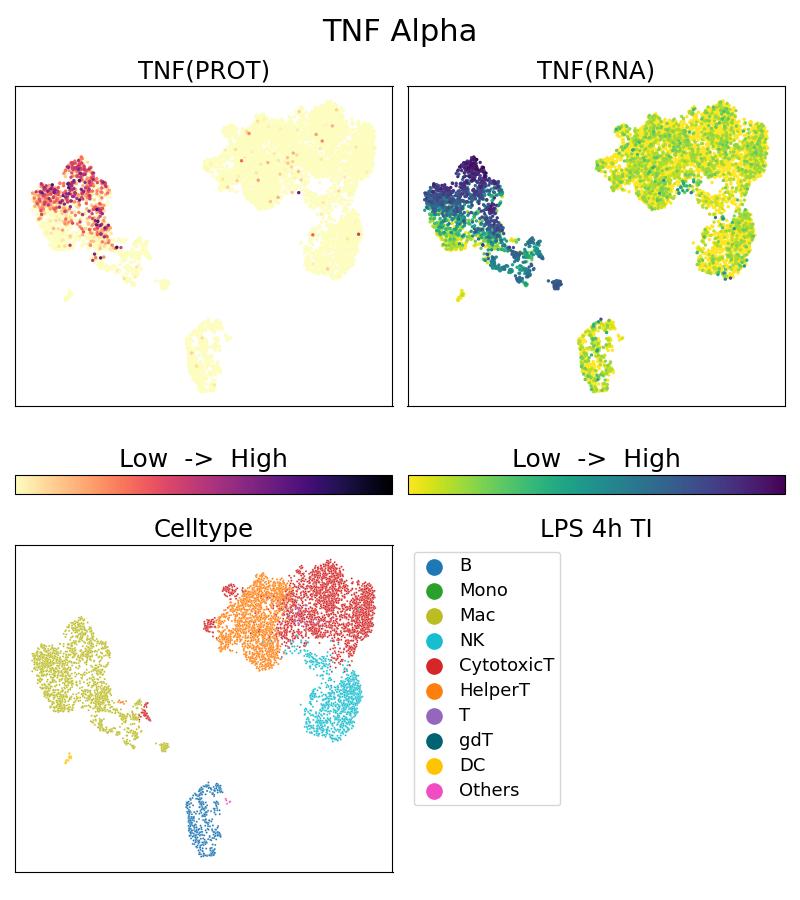验证数据展示
经过测试的应用
| Positive Single Cell (Intra) detected in | 10x Genomics Gene Expression Flex with Feature Barcodes and Multiplexing product. |
推荐稀释比
| 应用 | 推荐稀释比 |
|---|---|
| SINGLE CELL (INTRA) | <0.5ug/test |
| It is recommended that this reagent should be titrated in each testing system to obtain optimal results. | |
产品信息
G60291-1-5C targets TNF Alpha in Single Cell (Intra) applications and shows reactivity with Human samples.
| 经测试应用 | Single Cell (Intra) Application Description |
| 经测试反应性 | Human |
| 免疫原 |
CatNo: Ag11413 Product name: Recombinant human TNF-a protein Source: e coli.-derived, PET28a Tag: 6*His Domain: 1-233 aa of BC028148 Sequence: MSTESMIRDVELAEEALPKKTGGPQGSRRCLFLSLFSFLIVAGATTLFCLLHFGVIGPQREEFPRDLSLISPLAQAVRSSSRTPSDKPVAHVVANPQAEGQLQWLNRRANALLANGVELRDNQLVVPSEGLYLIYSQVLFKGQGCPSTHVLLTHTISRIAVSYQTKVNLLSAIKSPCQRETPEGAEAKPWYEPIYLGGVFQLEKGDRLSAEINRPDYLDFAESGQVYFGIIAL 种属同源性预测 |
| 宿主/亚型 | Mouse / IgG2b |
| 抗体类别 | Oligo Conjugate |
| 产品类型 | Monoclonal |
| 全称 | MultiPro® 5CFLX Anti-Human TNF Alpha (7B8A11) |
| 别名 | Cachectin, DIF, TNF, TNF a, TNF alpha, TNFA, TNF-a, TNF-alpha, TNFSF2, TNFα, TNF-α, Tumor necrosis factor |
| 计算分子量 | 233 aa, 26 kDa |
| GenBank蛋白编号 | BC028148 |
| 基因名称 | TNF-alpha |
| Gene ID (NCBI) | 7124 |
| ENSEMBL Gene ID | ENSG00000232810 |
| RRID | AB_3673901 |
| 偶联类型 | 5CFLX |
| 完整寡核苷酸序列 | CGGAGATGTGTATAAGAGACAGACACCGTATGATAGGCCCATATAAGAAA |
| 条形码序列 | ACACCGTATGATAGG |
| 形式 | Liquid |
| UNIPROT ID | P01375 |
| 储存缓冲液 | PBS with 1mM EDTA and 0.09% sodium azide , pH 7.3. |
| 储存条件 | 2-8°C Stable for one year after shipment. |
背景介绍
TNF, as also known as TNF-alpha, or cachectin, is a multifunctional proinflammatory cytokine that belongs to the tumor necrosis factor (TNF) superfamily. It is expressed as a 26 kDa membrane bound protein and is then cleaved by TNF-alpha converting enzyme (TACE) to release the soluble 17 kDa monomer, which forms homotrimers in circulation. It is produced chiefly by activated macrophages, although it can be produced by many other cell types such as CD4+ lymphocytes, NK cells, neutrophils, mast cells, eosinophils, and neurons. It can bind to, and thus functions through its receptors TNFRSF1A/TNFR1 and TNFRSF1B/TNFBR. This cytokine is involved in the regulation of a wide spectrum of biological processes including cell proliferation, differentiation, apoptosis, lipid metabolism, and coagulation. This cytokine has been implicated in a variety of diseases, including autoimmune diseases, INS resistance, and cancer.
Protocols
| Our current MultiPro staining protocol for the cocktail | Download protocol |
| 10x Genomics CG000149_Demonstrated Protocol CellSurface Protein Labeling_Rev D.pdf | Download protocol |



